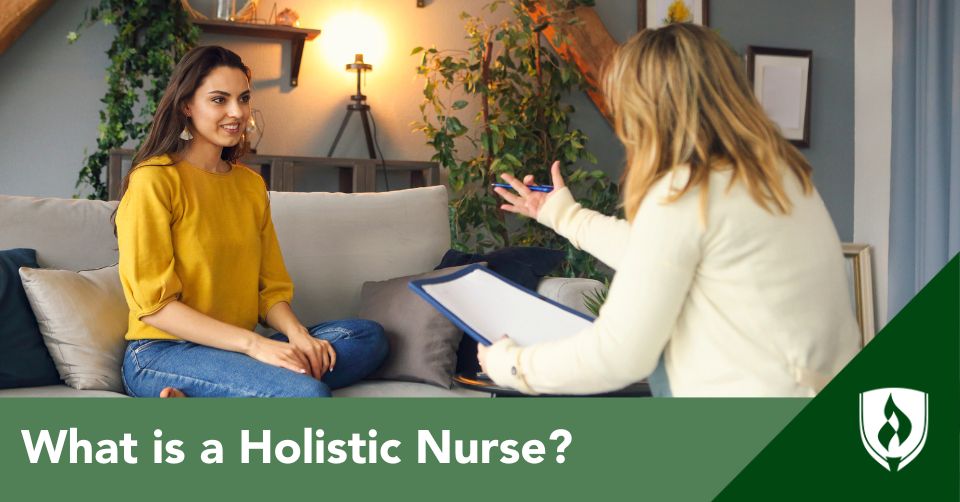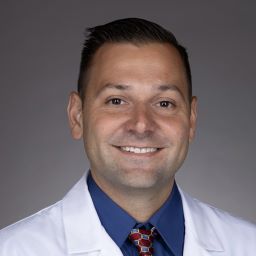
Holistic nursing is a practice of nursing that focuses on the whole person—including the mind, body, spirit and emotions in the delivery of health care. Where traditional medicine focuses on the treatment of diseases or disorders, holistic nursing views health as the overall well-being of a person. That goes far beyond the absence of disease.
In a holistic approach to healthcare, the interconnectedness of a patient's mind, body, spirit and emotions is a primary consideration. And holistic nurses approach patient care with all of these aspects in mind.
Nurses who are trained here in the United States tend to learn many core values that are rooted in holistic nursing. As you read more about what a holistic nurse is, you will see that nursing as a whole veers closer to holistic principles of healthcare than many other roles. Registered nurses and holistic nurses share many common attributes.
Holistic nursing is rooted in the foundations of healthcare
Hippocrates, the "father of medicine," emphasized the importance of observation in healthcare—along with a holistic view of health and wellness.
A "healthy mind in a healthy body" was the main component of the Hippocratic philosophy, according to research done by nursing professors in Greece. They write, "The Hippocratic philosophy on health care provision focused on the holistic care model, applying standards and ethical rules that are still valid today."1
Then, of course, Florence Nightingale (who is considered the founder of modern nursing) furthered the holistic approach to nursing by emphasizing the importance of environmental factors in patient care. Ecological factors are the rudimentary basis of today's holistic nursing practices, from fresh air, cleanliness, proper nutrition and the need for compassion in patient care.
In the 1960s and 1970s, there was a revival of interest in the holistic nursing practice. With the broader social movements of the time, the emphasis was on natural living, alternative medicine, a healing environment and (of course) peace and love.
The American Holistic Nurses Association (AHNA) came together in the 80's to support and promote the specialty of holistic nursing practice. The AHNA helps define holistic nursing certification, sets standards of practice and advocates for holistic nursing as a specialty.
Holistic nursing was officially recognized as a specialty by the American Nurses Association® (ANA) in 2006. This further legitimized the specialty and brought it into the mainstream healthcare settings.
What does it mean to practice holistic nursing?
But what does it mean to care for a patient holistically? Does it change the day-to-day nursing tasks you might perform? How does holistic nursing fit into the larger fabric of the healthcare industry?
1. To care for the whole person
In holistic nursing, it is all about seeing the bigger picture and not just focusing on the physical symptoms.
This specialty of nursing believes that healing really happens when you include a person’s mental, emotional and spiritual well-being. As nurses, a lot of us were trained to do this. Nursing instructors would remind us to show empathy, training us to deliver care that focuses on the emotional aspect of the patient.
Healthcare professionals do tend to believe this of course, whether they are holistic or not. But being able to make time and prioritize this kind of focus for each patient is sometimes easier said than done.
2. To use complementary therapies
One thing that makes a holistic RN different from a traditional RN is the blending of traditional medicine with complementary therapies.
Many holistic nurses will add some form of complementary therapy to their care. This is called "Integrative health," a holistic practice of care that utilizes other practitioners and therapies. Some complementary therapies a holistic nurse could draw on include...
- Aromatherapy
- Massage therapy
- Meditation/relaxation techniques
- Energy healing techniques
- Nutrition/diet work
- Herbal medicine
- Acupuncture
- Sound therapy
- Art and music therapy
- Nature therapy
- Exercise/physical activity
Holistic nurses notice how complementary therapies coupled with integrative approaches help patients not just physically, but mentally and emotionally as well.
3. To work with patients
When you look into the engine of what holistic nursing really is, you'll see that it's all about the patient. Every person is unique, and in holistic nursing, their care reflects that.
A holistic nurse is always trying to work together with their patients, ensuring that they feel involved in every decision. Holistic nursing care makes certain that the patients feel heard and empowered. By promoting patient preferences and making the patient feel heard and empowered, we believe healthcare is much more effective.
4. To practice a therapeutic presence
For holistic nurses, being fully present with a patient can sometimes be the most powerful thing we can offer.
It’s not just about the treatments given, but about how to engage and show up for them. Most registered nurses have seen firsthand how simply listening and being there can make a difference for our patients. The holistic nurse will take that little extra amount of time and let a frightened patient hold their hand or vent about the frustrations of a disease or healing process.
Holistic nurses perform their healing sometimes with just an ear to listen or a hand to touch.
5. To prioritize self care
Holistic nurses are on to something when they talk about the importance of self-care. It's not just for patients.
Something I have learned the hard way is, that as nurses, we really do need to take care of ourselves, too. At times, we focus on our patients to the neglect of our own well-being. This imbalance always catches up with you eventually.
Most nurses can agree with our holistic counterparts, that managing stress and maintaining a balance in work/life can make a huge difference in how you can show up for your patients.
How to become a holistic nurse
The path to holistic nursing is very similar to the path most registered nurses take. Holistic nurses are legally licensed nurses.
1. Get a nursing degree
First things first, you must earn a nursing degree from an accredited program.
You can opt for an Associate’s Degree in Nursing (ADN) or a Bachelor of Science in Nursing (BSN). Both will provide you with a solid foundation to start your career in nursing by helping you become a registered nurse.
2. Pass the NCLEX-RN® Exam
After graduation, you must register for the NCLEX-RN exam. Passing this exam is essential. This is how we all became legally licensed RNs. For more on that, check out Passing on the First Try: Why NCLEX Preparation Matters.
Once completed, apply for your state license, following all the specific requirements outlined by the state nursing board.
3. Gain experience as an RN
You will need to spend some time working as a registered nurse to build your skills and experience.
It is valuable to work in settings that emphasize holistic care and promote healing together, like integrative health clinics or wellness centers, as they align closely with the holistic nursing specialty.
4. Obtain holistic nurse certification
Holistic nurses can be certified in the specialty. The American Holistic Nurses Association has several certification categories. These are the requirements.
Holistic Nurse Board-Certified (HN-BC®)
- Unrestricted, current U.S. RN license
- 2,000 hours or one-year full time holistic nursing practice within the last five years
- 48 CNE hours in Holistic nursing theory, research, practice, or related topics, within two years of applying
- Graduate of a nationally-accredited nursing program
HNB-BC® (Holistic Nurse Baccalaureate Board Certified)
- Unrestricted, current U.S. RN license
- 2,000 hours or one-year full time holistic nursing practice within last five years
- 48 CNE hours in holistic nursing theory, research, practice, or related topics, within two years of applying
- Graduate of nationally accredited baccalaureate nursing program
AHN-BC® (Advanced Holistic Nurse Board Certified)
- Unrestricted, current U.S. RN license
- 2000 hours or one-year full time holistic nursing practice within last five years, which includes a minimum of 500 hours at the advanced level
- 48 CNE hours in holistic nursing theory, research, practice, or related topics, within two years of applying
- Graduate of nationally accredited graduate nursing program
APHN-BC® (Advanced Practice Holistic Nurse Board Certified)
- Unrestricted, current U.S. APRN license
- 2000 hours or one-year full time holistic nursing practice within last five years, which includes a minimum of 500 hours at the advanced practice level
- 48 CNE hours in holistic nursing theory, research, practice, or related topics, within two years of applying
- Graduate of nationally accredited graduate nursing program
These AHNCC certifications are recognized by the world's largest nursing accrediting association: The American Nurses Credentialing Center (ANCC®). This backing can assure you that their holistic nursing education is up to standard with the nursing profession as a whole.
5. Maintain certification and continuing education
Once certified, make sure to keep up with ongoing education and recertification every few years.
It is wise to join a professional organization like the AHNA, which offers great resources and networking opportunities. Staying engaged is an excellent way to advocate for holistic principles and the further development of holistic American nurses.
Nursing can take you into amazing elements of healthcare
If you're interested in holistic nursing, it's likely that you dream of doing healthcare a little differently.
As a nurse, you can integrate complementary therapies into your practice, such as focusing on exercise, nutrition or other therapies that interest you. Nurses can also work as a nursing coach for patients, offering education about health and well-being. Understanding the connection between mind, body and spirit will give shape and direction to your practice.
Where will you take it from there?
Find out what it takes to get into nursing school and get your holistic journey started at How to Get Into Nursing School: Your Step-by-Step Guide.
American Nurses Association® is a registered trademark of American Nurses Association
ANA® is a registered trademark of American Nurses Association
NCLEX-RN® is a registered trademark of National Council of State Boards of Nursing, Inc.
HN-BC® is a registered trademark of American Holistic Nurses Credentialing Corporation Margaret E. Erickson
HNB-BC® is a registered trademark of American Holistic Nurses Credentialing Corporation Margaret E. Erickson
AHN-BC® is a registered trademark of American Holistic Nurses Credentialing Corporation Margaret E. Erickson
APHN-BC® is a registered trademark of American Holistic Nurses Credentialing Corporation Margaret E. Erickson
American Nurses Credentialing Center® is a registered trademark of American Nurses Credentialing Center
ANCC® is a registered trademark of American Nurses Credentialing Center
1National Library of Medicine, Health care practices in ancient Greece: The Hippocratic ideal, (Mar.15, 2014), Health care practices in ancient Greece: The Hippocratic ideal - PMC (nih.gov)
2American Holistic Nurses Credentialing Corporation, Certification, (accessed 11/1/2024), Holistic Nurse - American Holistic Nurses (ahncc.org).




